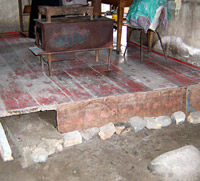
Teeth Are for Eating
This woman is Svetlana Arustamova. She is a refugee from Baku. Her house faces the cemetery in thevillageofNorabak, which has only new graves, without tombstones, and in some cases without even names. “Our graves remained where we will never go again,” Svetlana says weeping. “Is this a life? Things are so bad I can't even visit my family's graves.”
In Baku Svetlana was a public servant and worked at several plants as a fire safety officer. She says it would never have occurred to her that one day Armenians would be expelled fromBaku. “We lived well, we had decent salaries, were well respected, we didn't need anything. Ask any refugee, no one will say they had a bad life.”
 Svetlana lived alone inBaku—her family died before the exodus—and the single woman left everything behind and found herself in a “foreign” city –Yerevan.
Svetlana lived alone inBaku—her family died before the exodus—and the single woman left everything behind and found herself in a “foreign” city –Yerevan.
“I came fromBakuin 1989. I lived inYerevanfor one year – sleeping at the airport and train stations. I was getting by. Then I decided that I could not live like that. I went to the department that dealt with refugees. They sent me here and I've lived in Norabak for sixteen years now,” Svetlana says.
Norabak is a village in the Gegharkunik Marz. In Soviet times Azerbaijanis lived here but they left after 1988. Now most of the villagers are refugees and their lives are much like Svetlana Arustamova's.
 The house she lives in is a tumbledown one-story, one-room structure. Half of the floor is wooden, and in the other half the homeowner keeps hens in summer and stores her fuel, manure, in winter. “I had to rip up half of the floorboards because one winter I had no fuel at all. I survived by burning the floorboards,” she says. She makes use of everything at hand to survive. She likes to read but since she doesn't have books in Russian, she has reread John Galsworthy's The Forsyte Saga eighty times. “I can't live without books,” Svetlana says. “Books are an inseparable part of my life. I left a big, a very big, library inBaku.”
The house she lives in is a tumbledown one-story, one-room structure. Half of the floor is wooden, and in the other half the homeowner keeps hens in summer and stores her fuel, manure, in winter. “I had to rip up half of the floorboards because one winter I had no fuel at all. I survived by burning the floorboards,” she says. She makes use of everything at hand to survive. She likes to read but since she doesn't have books in Russian, she has reread John Galsworthy's The Forsyte Saga eighty times. “I can't live without books,” Svetlana says. “Books are an inseparable part of my life. I left a big, a very big, library inBaku.”
There is no library in this formerly Azerbaijani village; if there ever was, there are no books left now. Svetlana can't afford to subscribe to Russian-language periodicals. Her monthly income is 16,500 drams. In other words, she barely scrapes by, living on 550 drams (about $1.5) a day and vegetables from her garden. She says that most of her teeth were gold and she used them to survive, too.
 “There were instances when I had nothing to eat so I would sell the gold crowns on my teeth to buy bread.” Then she wonders at herself and says: “Teeth are for eating bread, but I sold my teeth to buy bread.”
“There were instances when I had nothing to eat so I would sell the gold crowns on my teeth to buy bread.” Then she wonders at herself and says: “Teeth are for eating bread, but I sold my teeth to buy bread.”
In the course of the last sixteen years, Svetlana has received no medical care, though her living conditions suggest that her health cannot be good. “I have no health left,” she says, but at the same time she doesn't want to have a checkup. “I'm afraid. If they examine me and it turns out that I have cancer or something else, what am I going to do? One needs a lot of money for treatment.”
She can't consider treatment on 16,500 drams a month, and has no idea of how she would even pay for the transportation to go and see a doctor. “I'm not complaining,” Svetlana says. “Thank God I have even this much. How could I complain when many people are living in worse conditions?”
 “What about tomorrow?” I ask, but she seems not to want to answer. She fastens her eyes on the cemetery across from her house and after a while she says, “What future are you talking about? One has no present; where is the future going to come from? There is no life, no interest. Do you know what being a refugee is? God forbid you should ever know. It's a state when one waits for one's death every single day.”
“What about tomorrow?” I ask, but she seems not to want to answer. She fastens her eyes on the cemetery across from her house and after a while she says, “What future are you talking about? One has no present; where is the future going to come from? There is no life, no interest. Do you know what being a refugee is? God forbid you should ever know. It's a state when one waits for one's death every single day.”
What Svetlana Arustamova said might have seemed be the product of a lonely woman's depression, if the more than a dozen refugees I met were any more optimistic, or felt themselves any less refugees.
 Videos
Videos Photos
Photos
Write a comment